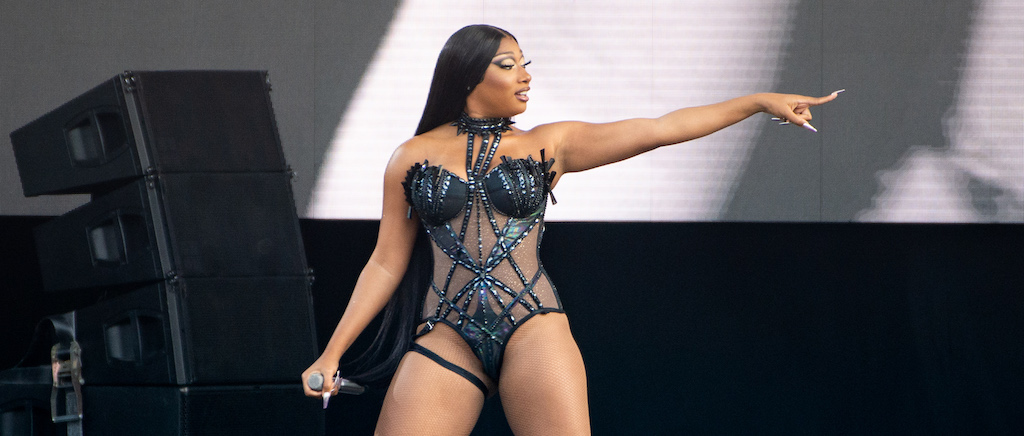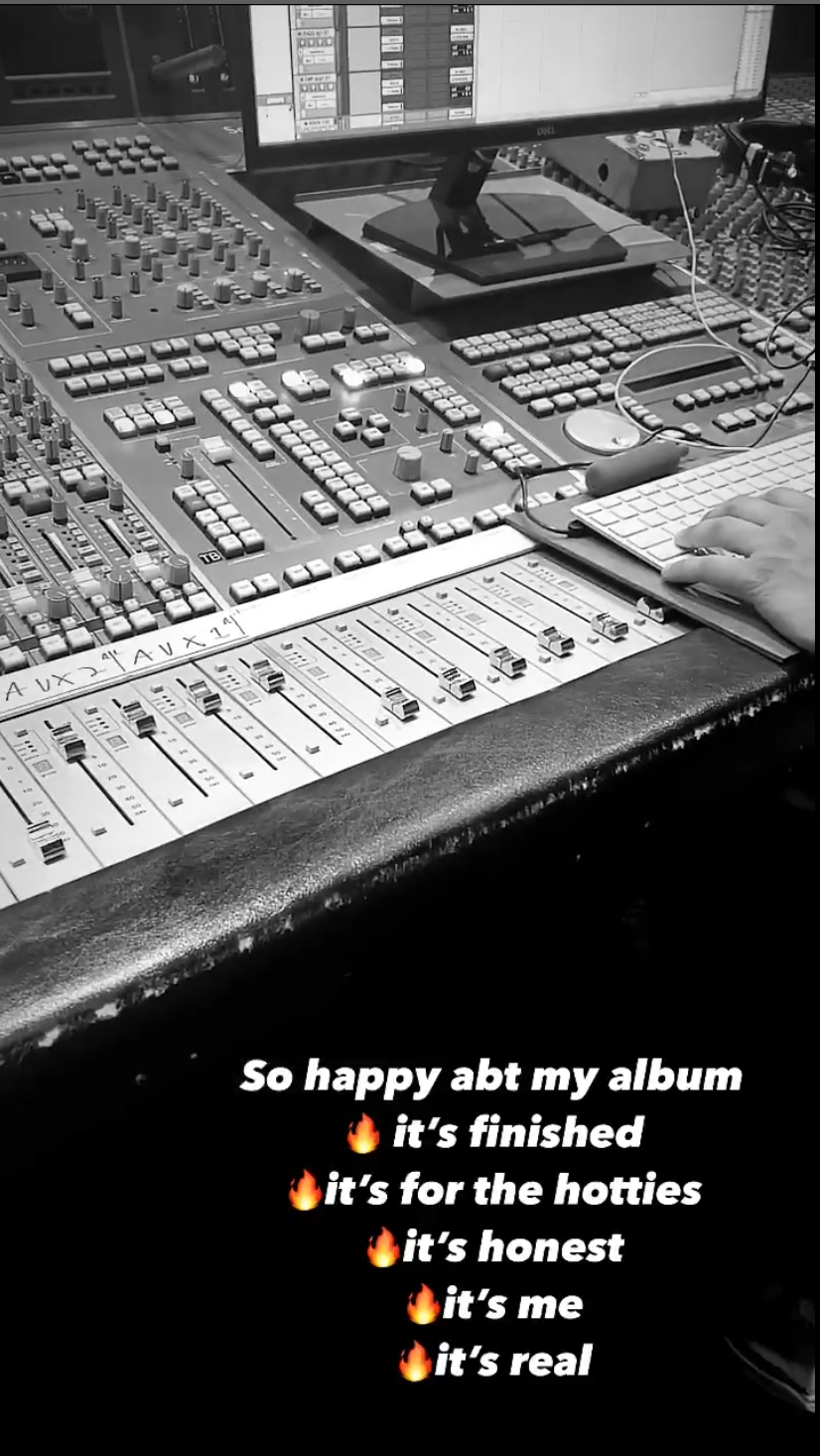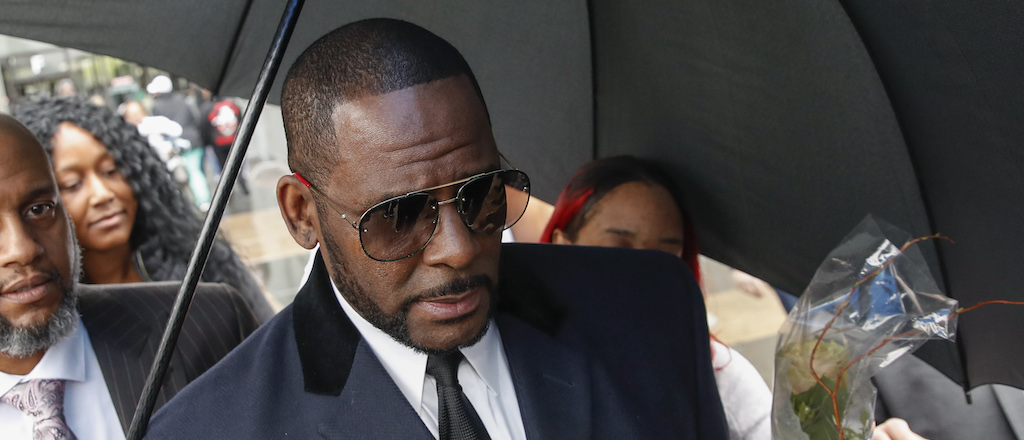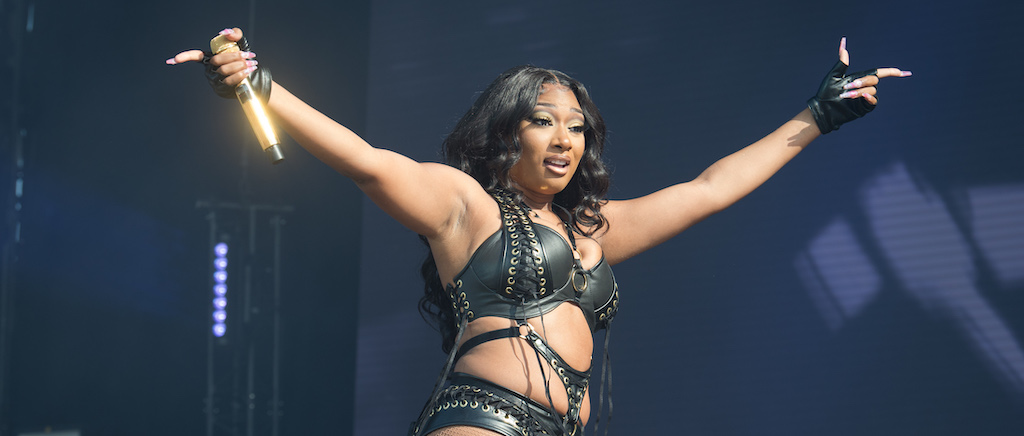
Month: July 2022
Future Honored With RIAA Plaque Commemorating 95 Million Certified Units

Megan Thee Stallion Says Her Next Album Is Finished And It’s ‘For The Hotties’

Megan Thee Stallion released her last album — depending on who you ask — in either 2020 with Good News or 2021 with Something For The Hotties. While her label, 1501 Certified Entertainment, disputes that the latter counts against her contract, that isn’t stopping the Houston rapper from proceeding with a follow-up. Yesterday, she posted a short Boomerang video to her Instagram Story announcing that her next album is finished. “So happy abt my album,” she wrote. “It’s finished. It’s for the hotties. It’s honest. It’s me. It’s real.” Check out a screenshot below.

Megan has apparently already begun the rollout for the album, sharing the first single, “Pressurelicious” featuring Future, earlier this month. She’s been performing in Europe including at festivals like Glastonbury, where she led a “my body, my choice” chant, and Gurtenfestival, where Erykah Badu shocked her by twerking as Meg cheered her on.
In an interview with Rolling Stone last month, Megan detailed her second official album, saying, “I want to take you through so many different emotions. At first you was twerking, now you might be crying.” She said that she had “25 to 30” songs to narrow down for the album’s final tracklist, which she’s apparently managed to do. Of course, there are always a lot of details that go into releasing an album for public consumption, so we might not hear it for a while, but it’s nice to know that it’s coming.
Megan Thee Stallion is a Warner Music artist. Uproxx is an independent subsidiary of Warner Music Group.
Migos May Be On Good Terms Again As They’re Set To Headline Pepsi’s 2022 National Battle Of The Bands

Nearly a year after they released their fourth album Culture III, breakup rumors regarding Migos began to swirl around the industry. It started after Offset unfollowed both Quavo and Takeoff on Instagram after the latter two announced their “Hotel Lobby” track under the moniker Unc And Phew. Both of these things pushed many fans to believe that Migos’ time together was nearing an end. Last month, the group canceled their scheduled performance at Governors Ball which only added fuel to the rumors, but it seems like all could be well in Migos land as the trio will headline Pepsi’s 2022 National Battle Of The Bands.
The National Battle Of The Bands is an annual music showcase that focuses on spotlighting Historically Black Colleges and Universities (HBCUs) and their marching bands. This year, the showcase will take place on August 27 and Migos’ performance will occur after the final band competition for the battle. The addition of Migos for the National Battle Of The Bands is a big one for the showcase as it marks the first time that a major internationally-known artist has performed at the competition.
Migos’ addition to the National Battle Of The Bands showcase comes after Quavo said that Migos’ solo endeavors help to keep the group together. “I feel like every group member has to establish themselves,” he said during an interview with GQ. “Their own body of work. If not, you start losing members.”
For more information about the National Battle Of The Bands, tickets, and the full listing of events, click here.
R. Kelly’s Self-Described Manager Pleads Guilty To Stalking And Harassing One Of The Singer’s Victims

Donnell Russell, who described himself as disgraced singer R. Kelly’s manager has pled guilty to stalking and harassing one of the singer’s sexual abuse victims, according to Rolling Stone. The 47-year-old was accused of harassing and intimidating a Jane Doe victim and her mother using emails, phone calls, and text messages to keep her from pursuing justice against Kelly. Russell was previously accused of making gun threats in an attempt to stop a screening of Surviving R. Kelly in New York City. Last week, he was convicted on those charges.
In a statement, United States Attorney Breon Peace said, “Russell used threats, harassment and intimidation in a deliberate effort to silence one of R. Kelly’s victims and prevent her voice from being heard. When his initial effort failed, he continued his vile campaign by sending threatening messages to Jane Doe and her mother, and publishing explicit photos of the victim on the internet before and after Kelly was indicted. As this prosecution makes clear, the defendant’s conduct was not only reprehensible, but it was also criminal and will not be tolerated.”
Among the tactics that Russell used were threats to post explicit photos of Jane Doe online if she didn’t withdraw her civil suit against him. He apparently followed through after over a year of threats, posting the photos to Facebook in 2020. He might have found a better use for his time; Kelly was found guilty of sex trafficking and racketeering last year and was sentenced last month to 30 years in prison.
Which Frank Ocean Album Is Better: ‘Channel Orange’ vs. ‘Blonde’

Earlier this month, Frank Ocean‘s first proper album Channel Orange turned 10, which naturally prompted writers to sing the praises of the highly acclaimed 2010s landmark. Except the critical love was curiously qualified in the same, specific way. For instance, Rolling Stone noted that Ocean’s second LP, 2016’s Blonde, has “arguably outshined Channel Orange in scope and impact.” Similarly, Stereogum also suggested that Blonde has “arguably eclipsed [Channel Orange] in terms of influence and prestige.”
For those keeping score, Channel Orange “arguably” is now down to Blonde in scope, impact, influence, and prestige. That’s four — count ’em four! — indicators of “greatness,” all leaning in the opposite direction away from Channel Orange. Actually, as far as critical consensus goes, “arguably” almost seems unnecessary at this point. Initially released to enthusiastic but somewhat reticent reviews — many critics, including yours truly, found it to be somewhere between a masterpiece and an incomplete mess — Blonde has indeed over time overshadowed (or “outshined” or “eclipsed”) its predecessor.
Consider that Pitchfork rated Blonde a 9.0 upon release – a stellar but slightly worse score than Channel Orange‘s 9.5 — only to rank it as the best album of the 2010s three years later. (Channel Orange came in at No. 10, a stellar but of course slightly worse placement.) Over at Rolling Stone, Blonde came out over Channel Orange on its Best Albums Of The Decade list, popping up at No. 12 vs. Channel Orange‘s (far too low) No. 37 ranking. But on the magazine’s 500 Greatest Albums Of All Time list, compiled just one year later, Blonde rose all the way to No. 79 — only three albums from the 2010s (Kanye West’s My Beautiful Dark Twisted Fantasy, Kendrick Lamar’s To Pimp A Butterfly, and Beyoncé’s Lemonade) did better, so perhaps Blonde is now considered that decade’s fourth best record. (Channel Orange meanwhile lagged behind at No. 148, ahead of John Prine’s self-titled debut and just below Jeff Buckley’s Grace.)
Two things appear to be true in terms of how Channel Orange is now perceived — first, it’s indisputably a classic album of its era and, second, it seems to be regarded as a bit worse than Blonde. But is this really about these Frank Ocean albums, or does it actually say more about the people who write about music for a living? I have a theory that there are actually two 2010s — early 2010s and late 2010s — and these adjacent micro-generations are defined musically in part by Channel Orange and Blonde.
I have a clear memory of when Channel Orange was released in the summer of 2012. Like almost anyone who cared about popular music at the time, I was primed for this record. I had enjoyed and reviewed 2011’s Nostalgia, Ultra, a mixtape (not technically an album) that showed Ocean to be a singer-songwriter with tremendous potential he was just coming to realize. Now all signs were pointing toward a major breakthrough.
Ocean appeared the night before the release on Late Night With Jimmy Fallon, and performed a startling rendition of one of the album’s most emotional tracks, “Bad Religion.” The song touched on the themes of unrequited love and personal identity that Ocean discussed in a widely read Tumblr post from one week prior, in which he revealed in heartfelt and poetic language that he had fallen in love with a man in 2009. This letter would inform how Channel Orange was subsequently heard and written about. First and foremost, it made Frank Ocean an artist that people wanted to see succeed.
Also on Fallon, it was announced that Channel Orange was actually out right now, a week earlier than expected. As this was the early 2010s, during the lull before streaming took hold, the rush release was intended to briefly circumvent piracy. And it worked: Many of us really did purchase the album download immediately after Fallon. We wanted to hear Orange as soon as possible, and it instantly became one of the first “event” albums of the social media era. In 2012, it was still novel for “everyone” to experience an album for the first time simultaneously online, and the impromptu late-night listening party undoubtedly added to Channel Orange‘s sense of importance.
Looked at more broadly, Channel Orange came out in the waning days of Barack Obama’s first term, and it pointed toward a future in which America’s first Black commander-in-chief became the first Democrat to win two presidential elections with a majority of the vote since FDR. In Ocean, many people saw a different kind of transformational figure, a forward-thinking paradigm-shifter whose sudden rise seemed to indicate real social progress for queer Americans. (Even Obama, who entered the White House officially opposed to gay marriage, had only changed his public position two months before Channel Orange was released.) This made Channel Orange in its time more than just an excellent album; it was also a feel-good story, an optimistic bellwether portending positive change on the horizon, a quintessential Obama-era cultural signifier.
Is it possible that these short-term attributes have somehow dated Channel Orange in retrospect? There are aspects of Channel Orange that feel much older than just a decade, especially when you compare it to Blonde. The circumstances of each album’s release have a striking yin-yang quality — while Channel Orange came out at a time when it appeared as though recent progressive gains would be impossible to reverse, Blonde arrived (along with the even more radical Endless) at the end of the Obama era, as the dread-inducing murk of Trump’s America loomed. This has shaped how both albums sound in 2022.
When Pitchfork placed Blonde at the top of its best of the 2010s list, the music site effectively retconned it as a record that expressed how it felt to be alive in the cursed late 2010s better than any other work of art. “The year 2016 crystallized the political disaster right under the surface.” writer Doreen St. Felix noted. “People theorized that we needed anthems to get us through the dark night. Big choruses, hooks as wide as highway signs, regular percussion that could gird us from chaos. But our mood was languorous; jingoism was the problem in the first place. We wanted the blurred, the softened, the existential.”
Channel Orange had once also seemed “blurred,” “softened” and “existential.” Upon its release, the album felt insular, strange, and willfully anti-commercial. That was part of Orange‘s progressive appeal. But in the wake of Blonde‘s much more extreme fragmentation — in which drums and most other instrumentation were eschewed to intensify the spotlight on Ocean’s pained, introspective isolation — Orange suddenly seemed relatively buoyant and accessible, if also (perhaps) less “real.” Whereas the relatively hopeful period that Channel Orange evokes seems further away each day, the alienated interior soundscapes of Blonde feel as new as the morning sunrise, not just in terms of influence — which has been immense on pop music, which is more vibey than ever — but emotional relevance. If Channel Orange hits like a happy but distant memory, Blonde feels as present as your latest breath.
I’ve spent a lot of time listening to Channel Orange and Blonde lately, and it should be noted, before anything else, that pitting them against each other is foolish. They are, again, highly complementary albums that offer distinctly different (but equally masterful) experiences. While my feelings about Blonde were initially mixed, I now hear it as an album that feels wholly unique to Ocean’s sensibility. With Channel Orange, critics were quick to put Ocean in a continuum of icons that included shapeshifters like Sly Stone, Stevie Wonder, and Prince, all of whom managed to make wildly successful pop on their own intensely eccentric terms. But with Blonde, Ocean made the case for starting his own continuum, in which future musicians would follow a path charted by him and him alone in the 2010s and beyond.
This is why Blonde, I’m sure, now gets the edge over Channel Orange in the minds of music writers. It feels more important. But while I acknowledge the musical ingenuity and power of that record, my recent spins tell me my heart still resides with Channel Orange. I just think the songs are better, while also registering more fully as songs as opposed to vibe-y setpieces. (You can’t convince me Frank has yet topped “Pyramids,” unless you want to make a case for “Thinkin’ Bout You” or “Forrest Gump.”) As an album, it is more dynamic and well rounded — it has the stripped-down gut-punches (“Bad Religion,” “Pink Matter”) that point toward Blonde, but it also has the catchy bangers (“Super Rich Kids,” “Lost”) that Frank mostly left behind on his second album.
Above all, Blonde would not exist without Channel Orange. First, Frank Ocean assembled his original masterpiece. Then he disassembled it in order to create a pared-down second masterpiece. Together, they represent a singular journey through an uncertain and tumultuous era.
Megan Thee Stallion And Big Sean Are Being Sued For Copyright Infringement

A Detroit rap duo is accusing Megan Thee Stallion of copyright infringement, claiming that a song from her 2020 debut Good News copies major elements of their own 2012, including its chorus, tempo, and tune. According to Complex, which acquired the court documents after rumors sprang up about the lawsuit on gossip blogs earlier this week, the lawsuit was filed by Duawn Payne and Harrell James, who go by Go Hard Major and H-Matic, and compares Megan’s track “Go Crazy” with their own song “Go Crazy.”
The lawsuit also names Big Sean, a featured artist on “Go Crazy,” as well as 1501 Certified Entertainment, 300 Entertainment, and Universal Music Publishing. Oddly enough, though, Complex notes that 2 Chainz, who also features on the song, is not named. Here’s the original “Go Crazy,” which you can compare to Megan Thee Stallion’s “Go Crazy” below:
Go Hard Major and H-Matic say they performed their song at multiple nightclubs in Detroit, Big Sean’s hometown, that he would have frequented. They also claim they’ve sold “thousands” of physical copies of the track on CD, creating plenty of opportunities for Sean to access the track. They’re seeking unspecified damages for copyright infringement and say they’ve sent cease and desist letters to both Megan and Sean.
Megan Thee Stallion is a Warner Music artist. Uproxx is an independent subsidiary of Warner Music Group.
Kevin Hart Gifts Chris Rock A Goat Named “Will Smith”

Kevin Hart and Chris Rock did a stand-up show in Madison Square Garden, and Kevin gave Chris a special gift. During Chris Rock and Kevin Hart’s comedy show in Madison Square Garden, people were laughing and enjoying the show. There were also two surprises presented during the show. One of which was Dave Chappelle, and […]
The post Kevin Hart Gifts Chris Rock A Goat Named “Will Smith” appeared first on SOHH.com.
NBA Youngboy Drops Catchy “She Want Chanel”
It’s been a good month for NBA Youngboy fans. The Louisiana rapper just beat federal gun charges, and now he’s planning to tour the US in celebration. There is one cloud that remains on the horizon for him, however; he still faces a gun charge in Louisiana.
But Youngboy hasn’t been letting his legal troubles distract him from making music. He’s already dropped two albums this year, Colors and the DaBaby collab BETTER THAN YOU. He also has another one coming soon, the thirty-song The Last Slimeto, which he’s already dropped a bunch of tracks for. Now, he’s given us even more music with a one-off single, “She Want Chanel.”
The song is as carefree as its music video, which shows Youngboy messing around in a ridiculous costume. And yet that doesn’t mean the track is necessarily half-baked. Youngboy delivers catchy melodies and breathless bars for nearly the entirety of the two-minute runtime.
Check out the song and its corresponding video below, and let us know what you think of it in the comments.
Quotable Lyrics
I know a trick, Make the b***h touch her toes
I make the b***h do a split for my bros
Talking more than a week, had her staying in my home
Carry like four hundred cash in a duffel bag
Dallas Airport Shooter Claims She’s Chris Brown’s Wife

A 37-year-old woman shot up a Dallas area airport and falsely claimed she was married to a well-known singer. Odufuwa Falsely Reports She’s Married To Chris Brown A video has surfaced of Portia Odufuwa, who was spotted walking in and out of the airport bathroom before deciding to shoot at the ceiling, causing travelers to […]
The post Dallas Airport Shooter Claims She’s Chris Brown’s Wife appeared first on SOHH.com.
